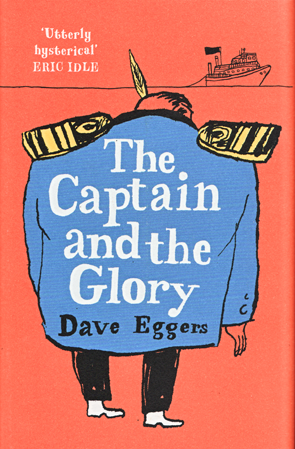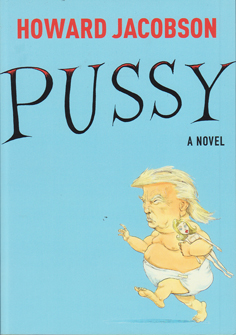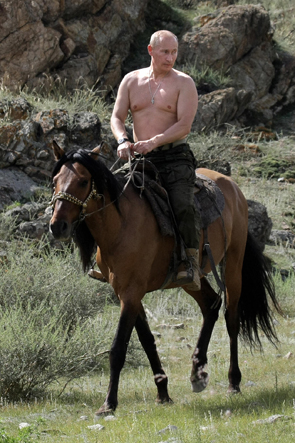Ben Novak may quip that if there is any metaphor involved in The Captain and the Glory, it is totally lost on me
[From the inside cover of the book]. But the book’s purpose, to satirise the Trump presidency through an allegorical tale of the sea, is unequivocal.
The Glory has been captained well for many years by a man so kind, tranquil and unflappable, that its passengers have bestowed upon him the honorific title of ‘Admiral’. Now the Admiral plans to retire, raising the question as to who shall replace him. Strangly enough, a man without any experience at leadership or captaining a vessel of any kind decides to put himself up for nomination, and his friends – known as the ‘Upskirt Boys’ – think this is so hilarious, that they support him. To gain support throughout the wider ship population, their candidate is presented as a straight talker, a man of the people who eschews the elitist language and discourse of the former captain. His lies, paradoxically, make him more trustworthy, his erratic leadership, likewise, is reassuring, since this new captain is going to shake things up.
The parallels with Donald Trump should need no explanation. Eggers’s satire follows many of the key points of Trump’s earlier presidency and the latter part of the narrative ventures into a grim morality tale in which the president is led down an ever-increasing dark path by his foreign buddies: The Pale One, a very transparent representation of Vladimir Putin; Bloodbeard, who seems to represent the Saudi regime; and the Man so Soft, who may represent Xi Jinping or Kim Jong-un.
Other characters from the Trump presidency also grace the pages. Trump’s daughter and senior advisor, Ivanka Trump, comes in for some pointed satire through the figure of the captain’s daughter. She is used to portray Trump’s cronyism and nepotism, while also highlighting his infamous treatment of women. Identified only as his daughter, the Ivanka figure is constantly sexualised through the eyes of the Captain, making for some rather awkward reading. Jarred Kushner, Ivanka’s husband and advisor to the president, is portrayed as a somewhat anaemic character, presented as nothing more than a favourite doll carried about by the captain’s daughter. Other figures in the Trump entourage are easily identifiable – Paul the Manafort and Michael the Cohen – while others are more tantalising: Benny the Squeeze, Freddie the Whack and Patsy the Murderer for instance. I guess the point is, this is a criminal operation.
The figure of the Admiral conflates Barrack Obama – the former captain – as well as John Cain. The Admiral’s war service is juxtaposed with the captain’s, who hid in the bowels of the ship, masturbating to pornographic magazines. Robert Mueller is wonderfully portrayed as the Sheriff of the Seas, an almost mute man who mysteriously turns up to write a report on the captain’s crimes and then disappears without saying anything, except to point portentously to his report when asked a question. Other aspects of Trump’s character and presidency are also touched upon: his failure to pay tax, his ripping off of colleagues, his megalomania and self-regard.
Eggers has a lot of material to draw from in this short book, as well as needing to offer some kind of resolution to the story even though, at the time of writing, the world is still living through the Trump presidency. I wondered as I read whether this might be as much a burden as a rich vein to mine. The allegorical style of the novel allows the narrative to skip along much more nimbly than Jacobson’s Pussy, but there is little time to consider the import of the captain’s role, except in the final denouement which far exceeds the horror that even the staunchest Democrats must by now have imagined. The limitation of the book, therefore, is that Trump is such an exaggerated character, his lies so brazen, his alleged crimes and his lack of empathy so bold, that it is hard to satirise him. Satire has traditionally been a weapon used to expose the foibles of public figures. By heaping scorn, by exaggerating their worst aspects, by caricaturising their most salient characteristics, satire is a weapon which has the potential to demystify and disempower the powerful. But for many, excepting his staunchest supporters, Trump is a figure who defies exaggeration. The problem is that any attempt to satirise him risks falling short, and in attempting to counter that, over-egging the fear that Trump engenders, the satire risks irrelevancy.
Some of the satire works quite nicely. Eva, a young girl who naysays the captain, suggests his supporters are most foul
, recalling Hilary Clinton’s criticism of Trump’s supporters in 2016 as deplorable
. Predictably the term ‘Deplorables’ became a badge of pride for Trump supporters. Eggers’s satire is on target in this case. Not only do the captain’s supporters embrace the term, but they create their own Most Foul costumes
. Taking the term’s homophone to heart, they create giant chicken suits in which they proudly strut about.
Most of the time, Egger's satire is spot on, but it adds little to our impression of Trump's presidency. It's accurate, but rarely as satirically inspired as the captain's parading chickens.
Whether Eggers’s book will have longevity is open to question. There have been a few Trump satires already and there are hundreds of books on his presidency, with more to be written over the years. The ending remains fine while ever Trump’s presidency remains current, but it is already evident that it was written prior to the report of the whistle blower who precipitated Trump’s impeachment. This would have been an obvious direction for this story to have taken, yet the book lurches towards visions of an apocalyptic end which may limit its appeal, no matter how justified some may find it. Egger’s satire is mostly fun if you are invested already in its message – as a gratification of one’s contemptible feelings for President Trump – but offers little hope to leaven its message. And the book will have no sway on Trump supporters, if they read it, and therefore cannot achieve one of the key purposes of satire: to ridicule and change minds. This is a book for the converted. It offers no really new insight into the Trump administration of the president’s character short of what people have already come to believe. In short, minds are already made up one way or another about the American president. This is a fun little tale which tries to offer some hope at its end, but it is mostly a despairing reminder of our times and the threat to American political ideals.
Related Books Reviewed on this Site:

 RSS Feed
RSS Feed Facebook
Facebook Instagram
Instagram YouTube
YouTube Subscribe to our Newsletter
Subscribe to our Newsletter









No one has commented yet. Be the first!